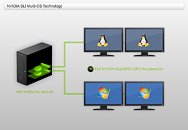Monday, March 30th 2009

NVIDIA SLI Multi-OS Empowers World’s First Virtualized Graphics Workstation
NVIDIA, the inventor of the GPU, today introduced NVIDIA SLI Multi-OS, a ground-breaking technology that allows users and visualization applications, for the first time, to take full advantage of multiple NVIDIA Quadro GPUs from a single graphics workstation in a virtualized environment.
This new technology delivers a faster, more efficient workflow to maximize productivity and lower the total cost of ownership for professionals in markets such as: digital content creation, sciences, manufacturing, and oil and gas.
"In today's economy, organizations are turning to virtualization to increase productivity and maximize cost savings," says Jeff Brown, general manager of professional solutions at NVIDIA. "Now professionals working with visualization applications can benefit from virtualization."Built into the new Quadro FX 3800, Quadro FX 4800, and Quadro FX 5800, SLI Multi-OS allows users to tap into the advanced visualization and compute capabilities of the Quadro GPUs to experience full graphics performance within a virtualized system. SLI Multi-OS works in association with Parallels Workstation Extreme virtualization software and Intel's VT-d technology, assigning both the host and guest virtual machine its own dedicated GPU. Available in the new HP Z800 workstation, the combination of these innovative technologies delivers application performance nearly identical to systems configured with a dedicated operating system and GPU.
"Working with NVIDIA to bring a new graphics virtualization usage model to life has required a deep commitment by both companies," said Serguei Beloussov, CEO of Parallels, a leader in virtualization and automation software "By combining the existing Parallels FastLane architecture with NVIDIA's new SLI Multi-OS capability, even the most demanding professionals can now experience the advanced features and performance benefits of NVIDIA's Quadro GPUs in a virtualized environment. This is a first for the industry and the business benefits will drive greater engineering innovation and productivity."
"SLI Multi-OS is the first technology to provide users working with multiple graphics-intense applications optimal visual quality and GPU performance from a single workstation within a flexible and virtualized environment," says Jim Zafarana, vice president and general manager, HP Workstations. "By offering this technology in our new HP Z800 workstations, we are giving our visualization customers the productivity and cost benefits of a virtualized workflow."
The SLI Multi-OS capability is available now on the new NVIDIA Quadro FX 3800, Quadro FX 4800, and Quadro FX 5800 graphics solutions and supports selected combinations of Windows XP, Windows Vista, and Linux operating systems. Current certified workstations include the new HP Z800. For more information on SLI Multi-OS, please visit: www.nvidia.com/object/sli_multi_os.html.
For more information on NVIDIA Quadro solutions, please visit: www.nvidia.com/quadro.
Source:
NVIDIA
This new technology delivers a faster, more efficient workflow to maximize productivity and lower the total cost of ownership for professionals in markets such as: digital content creation, sciences, manufacturing, and oil and gas.
"In today's economy, organizations are turning to virtualization to increase productivity and maximize cost savings," says Jeff Brown, general manager of professional solutions at NVIDIA. "Now professionals working with visualization applications can benefit from virtualization."Built into the new Quadro FX 3800, Quadro FX 4800, and Quadro FX 5800, SLI Multi-OS allows users to tap into the advanced visualization and compute capabilities of the Quadro GPUs to experience full graphics performance within a virtualized system. SLI Multi-OS works in association with Parallels Workstation Extreme virtualization software and Intel's VT-d technology, assigning both the host and guest virtual machine its own dedicated GPU. Available in the new HP Z800 workstation, the combination of these innovative technologies delivers application performance nearly identical to systems configured with a dedicated operating system and GPU.
"Working with NVIDIA to bring a new graphics virtualization usage model to life has required a deep commitment by both companies," said Serguei Beloussov, CEO of Parallels, a leader in virtualization and automation software "By combining the existing Parallels FastLane architecture with NVIDIA's new SLI Multi-OS capability, even the most demanding professionals can now experience the advanced features and performance benefits of NVIDIA's Quadro GPUs in a virtualized environment. This is a first for the industry and the business benefits will drive greater engineering innovation and productivity."
"SLI Multi-OS is the first technology to provide users working with multiple graphics-intense applications optimal visual quality and GPU performance from a single workstation within a flexible and virtualized environment," says Jim Zafarana, vice president and general manager, HP Workstations. "By offering this technology in our new HP Z800 workstations, we are giving our visualization customers the productivity and cost benefits of a virtualized workflow."
The SLI Multi-OS capability is available now on the new NVIDIA Quadro FX 3800, Quadro FX 4800, and Quadro FX 5800 graphics solutions and supports selected combinations of Windows XP, Windows Vista, and Linux operating systems. Current certified workstations include the new HP Z800. For more information on SLI Multi-OS, please visit: www.nvidia.com/object/sli_multi_os.html.
For more information on NVIDIA Quadro solutions, please visit: www.nvidia.com/quadro.

15 Comments on NVIDIA SLI Multi-OS Empowers World’s First Virtualized Graphics Workstation
enough horsepower for 4 gamers :laugh::laugh::laugh:
www.techpowerup.com/89179/New_On-Demand_Gaming_Platform_Threatens_to_Kill_Gaming_PC_Upgrades.html
Can you still mod Geforce cards to Quadros via software with the current generation? And if so, can this be done under OS-X?
let's start a conspiracy theory... :D:D:D